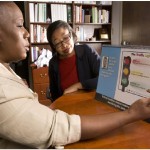Paula Hopes
Paula is a senior lecturer in the Learning Disability Team at Teesside University. As a new academic she is very interested in the perceptions of learning disability nurses, particularly within the current climate and The Shaping Care review. She has always had close links to the university having trained there 15 years ago.
She was previously employed as a Clinical Nurse Specialist in and LD Camhs team, working across a wide range of settings in developing behavioural approaches based on PBS and functional analysis. She has an MSc in Positive Approaches to Challenging Behaviour and currently leads on a CPD module developing practice in relation to this.
She has worked in a variety of settings across all ages in her career and considers herself passionate about the recognition of the voice of people with learning disabilities and their families.



